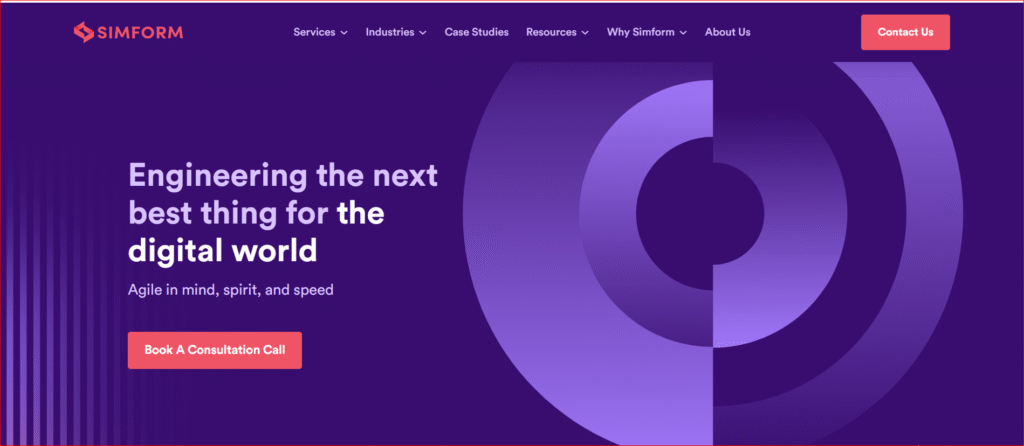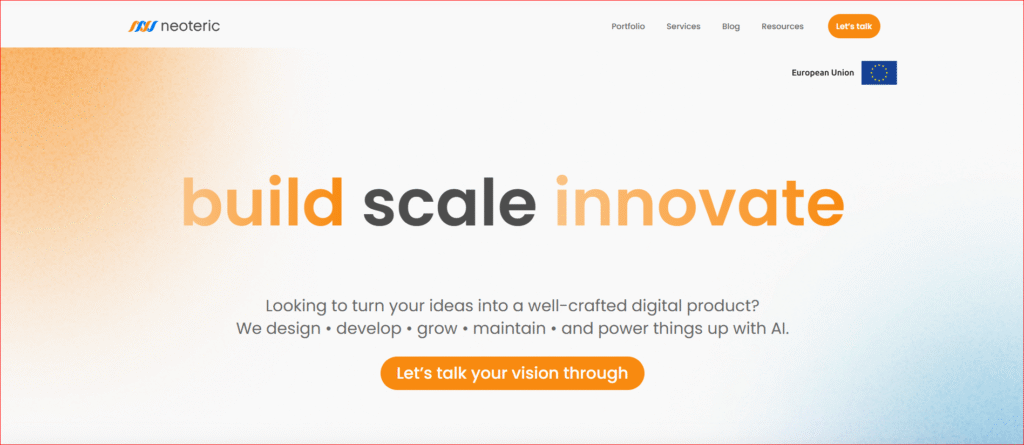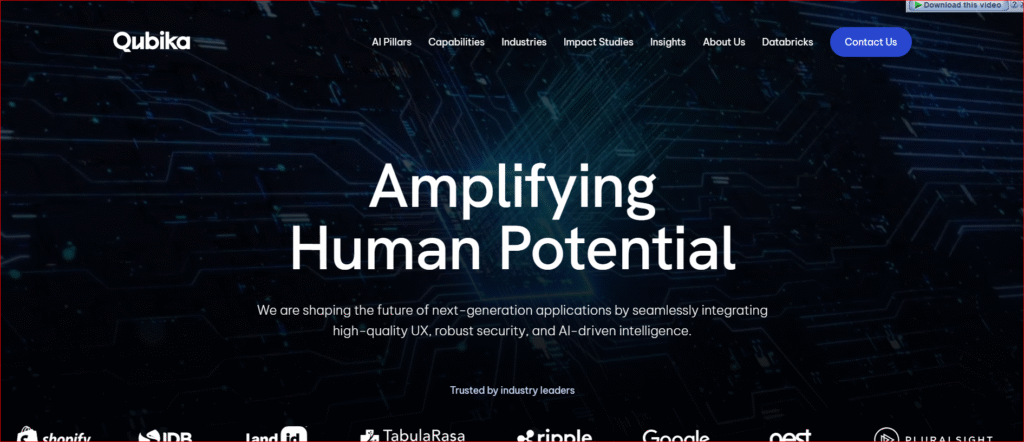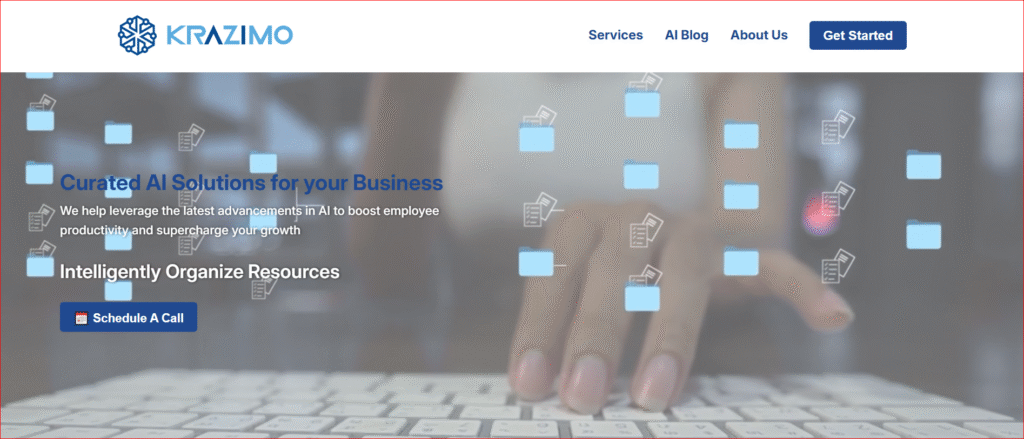Real estate professionals are drowning in data, but starving for insights. You’ve got CRM systems stuffed with lead information that never converts, property management software that tracks maintenance but can’t predict when your HVAC will fail, and market analysis tools that tell you what happened last month instead of what’s coming next quarter. Meanwhile, your competitors are closing deals faster, your marketing spend keeps climbing, and your agents are burning out trying to manually qualify leads that artificial intelligence could sort in seconds.
Here’s what most real estate executives don’t realize: the companies winning in today’s market aren’t just using better technology – they’re using AI to automate the repetitive tasks that eat up 60% of their agents’ time, predict which leads will actually close, and identify investment opportunities before they hit the MLS. But implementing AI in real estate isn’t about buying software and hoping it works. You need consultants who understand cap rates, know the difference between GRM and GRI, and can build predictive models that actually work with messy real estate data. You need specialists who’ve worked with everything from residential brokerages to commercial REITs, who understand lead scoring algorithms and can integrate AI with your existing PropTech stack.
Companies Featured in This Analysis:
- Pearl Lemon AI
- Simform
- Perfsol
- Neoteric
- Coherent Solutions
- Yellow Systems
- Edvantis
- Qubika
- Krazimo AI
- Root Quotient
1. Pearl Lemon AI

When real estate businesses need AI implementations that actually move the needle on their bottom line, we focus on the metrics that matter: lead conversion rates, days on market, and gross commission income. While other consultants talk about digital transformation, we build AI systems that solve the specific problems keeping real estate professionals awake at night – qualifying leads that never convert, missing market opportunities, and managing properties that drain cash flow instead of generating it.
Our real estate AI practice starts with understanding your existing tech stack – whether you’re running on Top Producer, Chime, or custom-built systems. We don’t force you to abandon working processes. Instead, we integrate AI capabilities that work with your current CRM, MLS feeds, property management platforms, and lead generation systems. Our team includes real estate professionals who understand the nuances of different property types, market conditions, and the regulatory environment that governs real estate transactions.
Our Core Real Estate AI Services:
- Predictive lead scoring algorithms that identify high-intent buyers and sellers
- Automated property valuation models (AVMs) using comparative market analysis data
- AI-powered chatbots for lead qualification and appointment scheduling
- Market trend prediction systems using MLS data and economic indicators
- Property investment analysis tools for portfolio optimization
- Automated marketing campaign management and ROI tracking
- Tenant screening and risk assessment algorithms for property managers
- Contract analysis and due diligence automation for commercial transactions
What separates us from generic AI consultants is our deep understanding of real estate business models and the unique challenges each sector faces. We know that residential agents need different AI tools than commercial brokers, that property managers have different data requirements than real estate investors, and that what works in hot markets like Austin or Nashville might not work in slower markets. Our AI solutions are built for real estate professionals who need systems that work with actual market conditions, not theoretical scenarios.
2. Simform

Simform brings substantial software development expertise to real estate AI projects, focusing on building scalable platforms that can handle the high-volume data processing requirements common in real estate operations. Their technical approach centers on creating robust backend systems that can integrate multiple data sources – MLS feeds, public records, demographic data, and proprietary databases – into unified platforms that support various AI applications.
Their real estate solutions emphasize mobile-first design, recognizing that real estate professionals spend significant time away from their desks. Simform’s mobile applications provide AI-powered insights and recommendations that agents can access while showing properties, meeting with clients, or working from remote locations. These applications are designed to function reliably even in areas with poor cellular coverage, storing data locally and synchronizing when connectivity is restored.
The company’s development methodology includes extensive testing with real estate professionals to ensure that AI recommendations align with actual market conditions and business practices. They understand that real estate AI systems must account for local market variations, seasonal trends, and the complex factors that influence property values and buyer behavior. Their solutions include comprehensive analytics dashboards that help real estate managers track the performance of AI systems and measure their impact on key business metrics like conversion rates and average transaction values.
Simform’s technical team includes specialists in data integration who can work with the various data formats and APIs common in the real estate industry. They have experience connecting AI systems with major real estate platforms, including MLS systems, popular CRM platforms, and property management software. Their integration capabilities extend to handling real-time data feeds and ensuring that AI models have access to current market information for accurate predictions and recommendations.
3. Perfsol

Perfsol specializes in developing AI solutions for real estate companies that need to process and analyze large volumes of property and market data. Their expertise lies in building machine learning models that can identify patterns in complex real estate datasets, including property characteristics, market trends, pricing data, and buyer behavior patterns. Their approach focuses on creating AI systems that provide actionable insights for real estate decision-making.
Their real estate AI implementations often center on predictive analytics applications that help real estate professionals anticipate market changes, identify investment opportunities, and optimize pricing strategies. Perfsol’s models can analyze factors like neighborhood development trends, demographic shifts, employment data, and infrastructure changes to predict how these factors will impact property values and market demand. These insights prove particularly valuable for real estate investors and developers who need to make long-term investment decisions.
The company’s technical approach includes developing custom algorithms specifically designed for real estate data characteristics. They understand that real estate data often includes subjective elements – property condition assessments, neighborhood desirability ratings, and market sentiment indicators – that require specialized handling in AI models. Their solutions include natural language processing capabilities that can analyze property descriptions, market reports, and customer feedback to extract meaningful insights.
Perfsol’s project teams include real estate industry specialists who ensure that AI models account for the unique aspects of different property markets and transaction types. They understand the differences between residential and commercial real estate analytics, the specific requirements of different real estate business models, and the regulatory considerations that affect real estate data usage. Their solutions are designed to provide insights that align with established real estate valuation methodologies and investment analysis practices.
4. Neoteric

Neoteric approaches real estate AI with a focus on user experience and practical implementation, recognizing that the success of AI systems depends largely on adoption by real estate professionals who may not have technical backgrounds. Their solutions emphasize intuitive interfaces and clear, actionable recommendations that real estate agents and managers can easily understand and implement in their daily operations.
Their real estate AI applications often focus on automating routine tasks that consume significant time for real estate professionals. This includes lead qualification systems that can analyze incoming inquiries and score them based on likelihood to convert, automated property matching systems that can identify suitable properties for specific buyer requirements, and scheduling systems that can coordinate property showings and client meetings based on availability and preferences.
The company’s development process includes extensive collaboration with real estate professionals to ensure that AI systems align with established workflows and business processes. Neoteric understands that real estate is fundamentally a relationship-based business, and their AI solutions are designed to support and enhance human interactions rather than replace them. Their systems provide recommendations and insights that help real estate professionals make better decisions and serve their clients more effectively.
Neoteric’s technical capabilities include integration with popular real estate platforms and tools, ensuring that AI systems can work within existing technology ecosystems. They have experience connecting AI applications with CRM systems, email marketing platforms, transaction management systems, and other tools commonly used in real estate operations. Their solutions are designed to provide value without requiring significant changes to established business processes or technology infrastructure.
5. Coherent Solutions

Coherent Solutions brings enterprise-level development capabilities to real estate AI projects, with particular strength in building systems that can handle the complex data management requirements of large real estate organizations. Their approach focuses on creating scalable AI platforms that can support multiple business units, property types, and market segments within a single organization.
Their real estate AI solutions often address the challenges faced by large real estate companies that operate across multiple markets and property sectors. This includes developing AI systems that can adapt to different local market conditions, regulatory requirements, and business practices while maintaining consistency in data analysis and reporting. Their platforms can integrate data from multiple sources and provide unified analytics and insights across an organization’s entire real estate portfolio.
The company’s technical expertise includes developing AI systems that can handle the security and compliance requirements common in real estate operations. They understand the importance of protecting sensitive client information, financial data, and proprietary market intelligence. Their solutions include robust security measures and audit capabilities that support compliance with real estate industry regulations and data protection requirements.
Coherent Solutions’ project teams include specialists in enterprise software architecture who can design AI systems that integrate with existing business systems and support future growth and expansion. They have experience working with large real estate organizations to implement AI capabilities that can scale across multiple offices, regions, and business lines. Their solutions are designed to provide consistent performance and reliable results even as data volumes and user bases grow over time.
6. Yellow Systems

Yellow Systems focuses on developing AI solutions that address specific operational challenges in real estate business management. Their approach centers on creating practical AI tools that can improve efficiency and decision-making in areas like property management, tenant relations, maintenance scheduling, and financial analysis. Their solutions are designed to provide immediate value while building foundation capabilities for more advanced AI applications.
Their real estate AI implementations often focus on property management applications where AI can provide significant operational improvements. This includes predictive maintenance systems that can anticipate when building systems or equipment will need attention, tenant screening algorithms that can assess risk factors and predict lease compliance, and automated rent optimization systems that can adjust pricing based on market conditions and property characteristics.
The company’s development approach emphasizes rapid deployment and iterative improvement, allowing real estate organizations to see results quickly while building more sophisticated capabilities over time. Yellow Systems understands that real estate businesses often need to demonstrate ROI from technology investments quickly, and their implementation methodology is designed to deliver measurable benefits in the early stages of AI deployment.
Yellow Systems’ technical team includes specialists in real estate operations who understand the specific workflows and requirements of different real estate business models. They have experience developing AI solutions for residential property management companies, commercial real estate firms, and real estate investment organizations. Their solutions are designed to address the unique challenges and opportunities present in each sector of the real estate industry.
7. Edvantis

Edvantis specializes in developing AI-powered analytics and reporting systems for real estate organizations that need sophisticated data analysis capabilities. Their solutions focus on creating comprehensive business intelligence platforms that can process multiple data sources and provide insights for strategic decision-making, market analysis, and performance optimization.
Their real estate AI applications often center on market analysis and investment decision support systems. Edvantis develops AI models that can analyze market trends, compare investment opportunities, and predict future market conditions based on historical data and current indicators. These systems prove particularly valuable for real estate investment firms, developers, and institutional investors who need sophisticated analysis capabilities to support major investment decisions.
The company’s technical approach includes developing custom data processing pipelines that can handle the variety of data formats and sources common in real estate analysis. They have experience integrating public records data, MLS information, demographic databases, economic indicators, and proprietary market research into unified analytical platforms. Their solutions can process both structured data from databases and unstructured information from market reports, news sources, and social media.
Edvantis’ development teams include data scientists with specific experience in real estate analytics who understand the statistical methods and modeling approaches most effective for real estate data analysis. They have expertise in developing predictive models for property valuation, market forecasting, and risk assessment that account for the unique characteristics of real estate markets and the factors that influence property values and investment returns.
8. Qubika

Qubika approaches real estate AI with a focus on creating integrated technology platforms that can support multiple aspects of real estate business operations. Their solutions emphasize connectivity and data sharing between different business systems, creating unified platforms that can support various AI applications while maintaining data consistency and operational efficiency.
Their real estate implementations often focus on creating what they term “intelligent real estate ecosystems” – integrated platforms that connect customer relationship management, property management, financial analysis, and marketing systems. These platforms provide a foundation for AI applications that can analyze data across multiple business functions and provide insights that consider the interconnections between different aspects of real estate operations.
The company’s strength lies in their ability to handle complex integration projects that connect AI systems with existing real estate technology infrastructure. Qubika has experience working with the various software platforms, databases, and systems commonly used in real estate operations, and they can develop solutions that work within existing technology environments without requiring major system replacements or workflow changes.
Qubika’s technical teams include specialists in system integration and data architecture who can design AI platforms that can grow and evolve with changing business requirements. They understand that real estate organizations often need to adapt their technology capabilities as market conditions change, business models evolve, and new opportunities emerge. Their solutions are designed to provide flexibility and extensibility that supports long-term technology planning and investment.
9. Krazimo AI

Krazimo AI focuses on developing specialized AI applications for specific real estate business functions, with particular expertise in areas where machine learning can provide significant competitive advantages. Their approach centers on identifying high-impact opportunities for AI implementation and developing focused solutions that deliver measurable results in specific areas of real estate operations.
Their real estate AI solutions often address challenges in lead generation, customer acquisition, and sales process optimization. Krazimo develops AI systems that can analyze prospect behavior, predict conversion likelihood, and recommend optimal engagement strategies for different types of potential clients. These systems can help real estate professionals focus their efforts on the most promising opportunities and improve their overall sales effectiveness.
The company’s technical approach includes developing AI models that can adapt to changing market conditions and business requirements. They understand that real estate markets can be volatile and that AI systems need to maintain accuracy and effectiveness even as market conditions change. Their solutions include monitoring and adjustment capabilities that can detect when models need updating and can automatically adjust algorithms based on new data and changing conditions.
Krazimo’s development process emphasizes close collaboration with real estate professionals to ensure that AI recommendations align with business objectives and market realities. They understand that successful AI implementation requires more than technical accuracy; it requires solutions that real estate professionals can trust and effectively use in their daily operations. Their systems are designed to provide clear explanations for AI recommendations and to support human decision-making rather than replace it.
10. Root Quotient

Root Quotient takes a data-science-first approach to real estate AI, focusing on extracting maximum value from the vast amounts of data generated by real estate operations. Their methodology emphasizes comprehensive data analysis and modeling to identify patterns, trends, and opportunities that can inform strategic decision-making and operational improvements in real estate businesses.
Their real estate AI implementations often begin with extensive data audits and analysis to understand what information is available, how it can be integrated, and where AI applications can provide the greatest value. Root Quotient’s team includes data scientists with specific expertise in real estate analytics who understand the unique characteristics of real estate data and the analytical approaches most effective for real estate applications.
The company’s solutions frequently focus on predictive analytics applications that can help real estate organizations anticipate market changes, identify investment opportunities, and optimize operational strategies. Their AI models can analyze historical transaction data, market trends, demographic information, and economic indicators to provide insights about future market conditions and investment prospects.
Root Quotient’s technical capabilities include developing custom AI models that can handle the specific requirements and constraints of different real estate business models. They understand that residential real estate, commercial properties, and real estate investment operations have different analytical needs and require different approaches to AI implementation. Their solutions are designed to provide insights that are relevant and actionable for specific real estate business contexts and objectives.
Real estate AI isn’t about replacing human expertise – it’s about giving real estate professionals superpowers. The companies listed here understand that successful AI implementation requires more than just technical capabilities; it requires deep understanding of real estate business models, market dynamics, and the daily challenges faced by real estate professionals.
The key to choosing the right AI consultant lies in finding partners who speak your language, understand your specific market conditions, and can deliver solutions that work with your existing systems and processes. Look for consultants who can demonstrate measurable results, provide clear ROI projections, and offer ongoing support as your AI capabilities mature and expand.
Ready to see how AI can multiply your real estate business results? Book a strategy session with real estate AI specialists who understand your market and can show you exactly how to implement AI systems that close more deals and generate higher profits.
FAQs About AI Consultants for Real Estate Businesses
1. How can AI consultants help real estate businesses?
AI consultants help real estate firms use artificial intelligence to optimize operations, marketing, sales, and property management. They offer strategies for automating tasks, analyzing market trends, generating leads, and improving customer experiences with AI-powered tools.
2. What are the most common AI applications in real estate?
Popular AI use cases include:
- Predictive pricing and property valuation
- Automated lead scoring and CRM integration
- Chatbots for 24/7 client support
- Image recognition for property listing enhancement
- Market trend analysis and investment forecasting
3. Are AI solutions only for large real estate companies?
Not at all. Many AI tools and consulting services are designed for small to mid-sized agencies, brokers, and property managers. Scalable solutions allow even solo agents to leverage AI for marketing, prospecting, and operations.
4. What kind of data is needed to implement AI in real estate?
Real estate AI thrives on data like property listings, market history, customer inquiries, sales transactions, and location-based trends. AI consultants help you structure and use this data effectively to drive insights and automation.
5. How quickly can a real estate business see ROI from AI consulting?
Depending on the scope, many real estate firms see ROI in as little as 3–6 months through increased lead conversions, faster deal cycles, and reduced manual workload. Quick wins like chatbots or automated emails often deliver immediate results.




